| The Greeks |
| Ancient Greece
I. Minoan Civilization (c. 2000-1400 BCE)
Crete
II. Mycenaean Civilization (c. 1600-1200 BCE)
Greek mainland
|
| I. Minoan Civilization (c. 2000-1400 BCE) |
|
Centered in Palace of Minos, at Knossos, Crete
3 stories with labyrinthine structure: many rooms and corridors around central courtyard
By 2000 BCE Minoans developed hieroglyphic script
Later writing (“Linear A”) advanced to “Linear B,” which is apparently an early form of Greek
1700 BCE: Minoan Civ devastated by earthquake
(Fiero 78-79)
Palace of Minos, Knossos, Crete
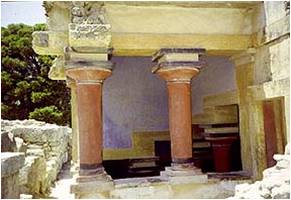
Bull-leaping: fresco from Palace of Minos
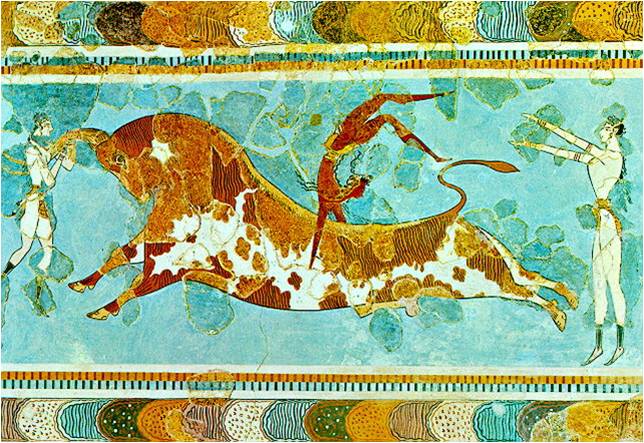
Fresco is very likely connected to the cult of the bull, which symbolized virility
The ritual picture here looks forward to the modern bullfight
(Fiero 78)
|
|
Legend of Minotaura
|
|
The ancient Greeks developed myths and legends about the Minoans
Most famous legend is about the Minotaur: half-man and half-bull, born of bull & Minos’ queen
Minotaur lived in labyrinth designed by Daedalus
Gr. hero Theseus, with help of king’s daughter Ariadne, killed Minotaur in labyrinth, laying thread to find his way back—thus ending King Minos’s human sacrifice of Greeks to the Minotaur
|
|
Myth of Daedalus & Icarus
|
|
Daedalus locked in tower by King Minos
Escapes by making wax wings for himself and his son Icarus
Icarus departs from father and flies too high
The wax melts and Icarus falls to his death
Daedalus reaches Sicily in safety
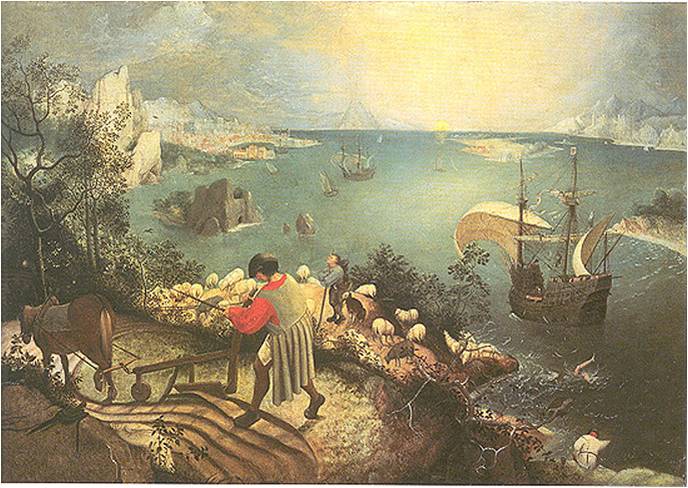
Brueghel, Landscape with the Fall of Icarus, 1558

|
|
II. Mycenaean Civilization
|
|
At Mycenae
“militant and aggressive”
c.1400 BCE: Mycenaeans absorb Crete
c. 1200 BCE, Mycenaeans attack Troy in Asia Minor: 10 year war (tradition says it was over Helen’s abduction by Paris of Troy)
Soon after, Dorians destroy Mycenaean civilizationà Dark Ages
(Fiero 80)
|
|
Homer
|
|
Legendary blind poet, author of Iliad and Odyssey, Greek epics
“Homer” represents oral tradition that was eventually written down in 9th century BCE
(Fiero 80-81)
|
|
Iliad
|
|
Wrath of Achilles (at Agamemnon, for stealing his prize Briseus)
Achilles: son of Pelius, king of Thessaly, and the sea goddess Thetis
Focuses on arete: virtue or excellence—even if the consequence is death, and even in the face of the gods
Arete means being the best that one can be
The Iliad: a man’s world?
(Fiero 81)
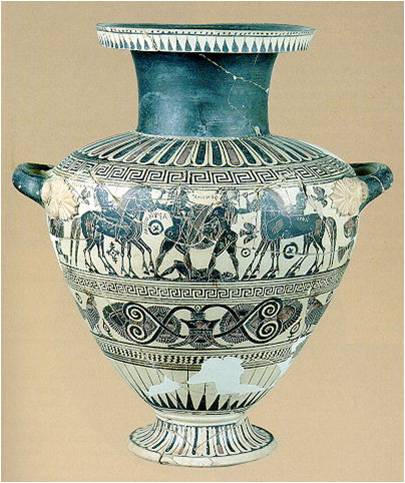
|
|
Homer: Simile & Epithet
|
|
Simile: See Iliad, Book 18.113-116, 133-139 (Fiero 81-84)
Epithets: “swift Antilochus” (18.2); “the great Achilles” (18.33); “man-killing hands” of Achilles (24.177); “great godlike Achilles” (24.186); “old and noble Priam” (24.263); “brilliant Achilles” (24.316)
Troy Movie - Achilles, Patroclus & Odysseus - 2 Parts - YouTube
Death of Patroclus - Troy - YouTube
David, The Funeral of Petroclus, 1778
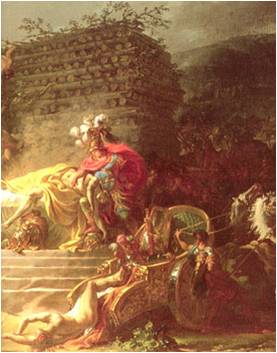
Twombly, Achilles Mourning the Death of Petroclus, 1962
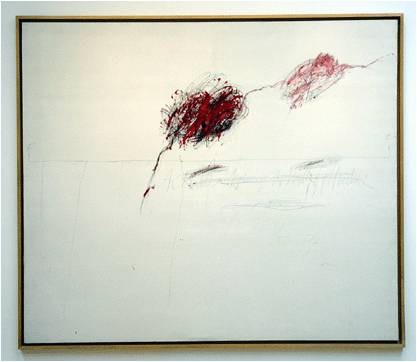
|
|
Hesiod, Theogony (700 B.C.E.)
|
|
Zeus, Hera, etc., live on Mount Olympus
meddle in human affairs
no clear moral or religious system
no guarantee of afterlife—focus is on being remembered for one’s actions in this life
Thus, Greek culture celebrates individual glory and individual responsibility
(Fiero 85)
|
|
Greek Politics and Society
|
|
During the Homeric Age, heroes are celebrated: it is an aristocratic age
Ca. 750 BCE: the rise of the polis: Greek city-state
Athens, Thebes, Marathon, Corinth, Sparta, etc.
About 200 of them
City-states are self-governing, self-defending
Take their own colonies
Compete with one another
(Fiero 86-87)
|
|
Persian Wars, 499-480 BCE
|
|
Greek city-states unite to defend themselves against Persia
Battle of Marathon, 490 BCE, Greeks defeat an army of Persians 2X bigger
After Persian Wars, Athens becomes predominant Greek polis
(Fiero 86)
|
|
Greek Golden Age: 480-430 BCE
|
|
Oligarchy (elite minority) --> Democracy (gov. by the people, demos)
Solon (ca.638-558 BCE): spread democracy: involved lower classes in gov.
Ca.550 BCE: Popular Assembly
508 BCE: Popular Assembly can make laws
(Fiero 86-87)
|
|
Greek Government Structure
|
|
Board of Ten Generals
Council of Five Hundred (aristocratic bureaucracy)
Popular Assembly of Citizens
Democracy?
Citizen = landowning males over 18 (not women, resident aliens, slaves)
Total population: 250,000
Citizens: 40,000
Actually attended Assembly (4 times a month): 5,000
(Fiero 87)
Agora= “open air market”
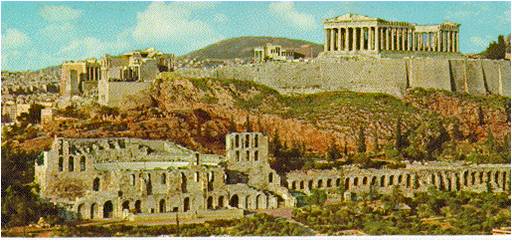
|
|
Pericles (ca.495-429 BCE)
|
|
Leading supporter of Athenian democracy
Many public offices filled by lottery
Delian League: defensive alliance
Pericles moves funds from Delos to Athens; uses funds to rebuild Athenian temples
Angers Sparta
(Fiero 87-88)
|
|
Peloponnesian Wars (431-404 BCE)
|
|
Athens vs. Sparta
Sparta not democratic, more militaristic than Athens
Athens loses to Sparta
Pericles, Funeral Speech, delivered at the funeral Athenians killed in first battles of war (recorded in Thucydides’ Peloponnesian Wars, ca. 410 BCE)
(Fiero 88)
|
|
Pericles, Funeral Sermon (Fiero 88-89)
|
|
Athenians respect written and unwritten laws (line 40)
Athenians know how to relax and are “lovers of the beautiful” (line 79)
Wealth is not for “ostentation” but for “use” (line 80)
Athenians are interested in public affairs (line 86)
Athenians value thinking/discussion before action (line 91)
|
|
Sophocles, Antigone c. 442 B.C.E.
|
|
Sophocles, Theban Trilogy:
Oedipus the King
Oedipus at Colonus
Antigone
|
|
Oedipus: a quick look
|
|
Oedipus unknowingly killed his father and married his mother, Jocasta
With Jocasta, he had four children: Eteocles, Polynices, Ismene and Antigone
Oedipus: the next generation
After death of Oedipus, Polynices and Eteocles struggled for power, after Eteocles violated agreement to rule in alternate years
Polynices attacked the city of Thebes; Eteocles defended the city and the two brothers died at the city gates
After the brothers’ deaths, Creon (the brother of Jocasta and uncle to both Oedipus and his children) became king.
Now Creon decrees that Polynices shall not be buried; anyone who dares to bury him will be sentenced to death.
Will Antigone obey Creon?
Certainly not. Antigone believes that burying her brother is her obligation. She believes she is following
divine law, higher than the state’s law. She buries Polynices, and Creon sentences her to death.
Antigone’s sister Ismene refuses to help with the burial, but later supports Antigone
|
|
Haemon vs. Creon
|
|
Antigone is engaged to marry Haemon, Creon’s son.
Creon’s sentencing of Antigone causes Haemon to reject his father.
Some other characters:
Teiresias: the blind prophet who predicts that Creon will be doomed for his actions, which defy the laws of the gods.
The Chorus: the group of men (in this play, they are Theban elders) who comment on the action
|
|
Antigone (Fiero 92-99): some themes
|
|
Individual/popular opinion vs. the state (562-71; 600-01)
Female power vs. male power (51-53; 552-55)
Divine/universal law vs. human law (357-63)
|
|
Individual/popular opinion vs. the state
|
|
Haemon [to Creon]: I can hear the things murmured in the dark, and the whole city weeps for this maiden [Antigone]. (565-66)
Creon: Shall Thebes, then, tell me how to rule?
Haemon: Now who speaks like a boy? (600-01)
|
|
Female power vs. male power
|
|
Ismene [to Antigone]: No, no, we must remember we were born women, not meant to strive with men. We are in the grip of those stronger than ourselves, and must obey them in this and in things still more cruel. (51-55)
Creon [to Haemon]: Therefore we must uphold the cause of order, and certainly we must not let a woman defy us. It would be better to fall from power by a man’s hand, than to be called weaker than a woman. (552-55)
|
|
Divine/universal law vs. human law
|
|
Creon: And you have the boldness to transgress that law [not to bury Polynices]?
Antigone: Yes, for it was not Zeus made such a law; such is not the Justice of the gods. Nor did I think that your decrees had so much force, that a mortal could override the unwritten and unchanging statutes of heaven. For their authority is not of today nor yesterday, but from all time, and no man knows when they were put forth. (357-63)
|
|
Aristotle, Poetics
|
|
Unities of action and time
Tragedy: “imitation of an action” arousing “pity and fear” leading to catharsis (purgation)
Hero “better than the ordinary man”
His downfall “must not lie in any depravity, but in some great error on his part”
Creon’s hubris (excessive pride) is his tragic flaw
(Fiero 99)
Aristotle’s definition of tragedy:
“Tragedy, then, is an imitation of an action that is serious, complete, and of a certain magnitude; in language embellished with each kind of artistic ornament, the several kinds being found in separate parts of the play; in the form of action, not of narrative; with incidents arousing pity and fear, wherewith to accomplish its katharsis of such emotions. . . .” (Aristotle, Poetics, part 6)
http://classics.mit.edu/Aristotle/poetics.1.1.html
|
|
Pre-Socratic Philosophers
|
|
Scientific thinkers asking what the world is made of and how it came into existence
Thales: water
Heraclitus: flux, change—dictated by Form or Guiding Force (“You cannot step twice in the same river”)
Leucippus of Miletus: atoms
Democritus: atoms make up the mind too
(Fiero 100)
Pythagoras: proportion (numbers)
Hippocrates: “father of medicine”
Humours: blood, phlegm, black bile, yellow bile
(Fiero 100-01)
|
|
Sophists
|
|
Not scientists but metaphysicians: concerned with how we know
Traveled around to teach people, for pay
Focused on rhetoric more than truth
They thrived in a democracy where the ability to persuade was important
e.g., Protagoras (ca. 485-410 BCE)
“Man is the measure of all things.”
(Fiero 101)
|
|
Socrates (ca. 470-399 BCE)
|
|
A stonemason who walked around Athens talking to people: a gadfly
Opposed sophistry: no charge for teaching, opposed the use of clever argument
Instead: “Know thyself”
“the unexamined life is not worth living”
To know the good is to do the good
(Fiero 102)
|
|
Plato, Crito (ca. 390 BCE)
|
|
In 399, Socrates put on trial for “subversive behavior, impiety, and atheism”: sentenced to death
Plato’s Crito: Crito, Socrates’ friend/pupil, tries to convince him to escape from prison. Socrates explains why he chooses death sentence rather than escape. What is Socrates’ reasoning?
(Fiero 102)
Why Socrates refuses to escape death
He has agreed to follow all the laws, regardless
He must either follow the law or convince the state that the law is unjust
His living in Athens his whole life constitutes an agreement to obey the law
Indeed, he had the opportunity, at his trial, to choose exile rather than death, but he refused exile
Question: How does Socrates’ choice of death over dishonor compare/contrast to Antigone’s?
(Fiero 102-04)
David, The Death of Socrates, 1787
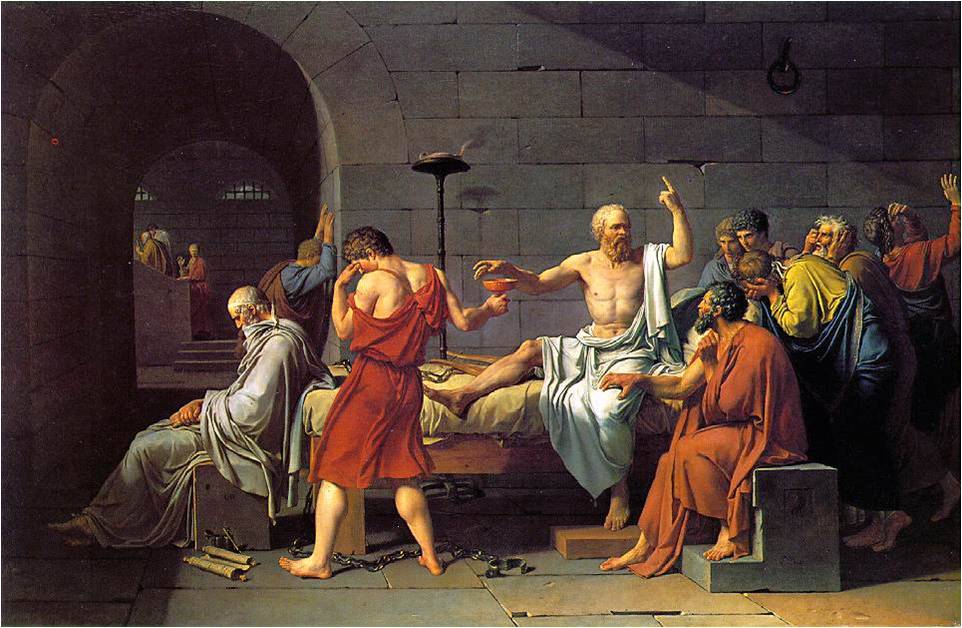
|
|
Plato (ca. 428-ca. 347 BCE)
|
|
We know Socrates through Plato
Socrates is a character in Plato’s dialogues
Through dialectical method (question and answer method) one moves closer and closer to the truth
(Fiero 104)
Plato’s Theory of the Forms
All sense experience is an imperfect copy of the Forms. A ball, for example, is an imperfect copy of the Form of the Sphere.
The Forms derive from the ultimate Form, the Form of the Good
(Fiero 104)
the psyche, or mind/soul, comes from the world of the Forms, while the soma, or body, is trapped in the sensory world.
Where do we get the idea of the perfect sphere? Plato would say we get it from our soul’s connection to the perfect world of Forms.
(Fiero 104)
|
|
Plato, Allegory of the Cave
|
|
In the Republic
Allegory: story with figurative or hidden meaning story (allos=other + agoreuein=to speak publicly < agora=marketplace)
A parable for the movement from sense experience to the Form of Goodness
The Cave: An Adaptation of Plato''s Allegory in Clay - YouTube
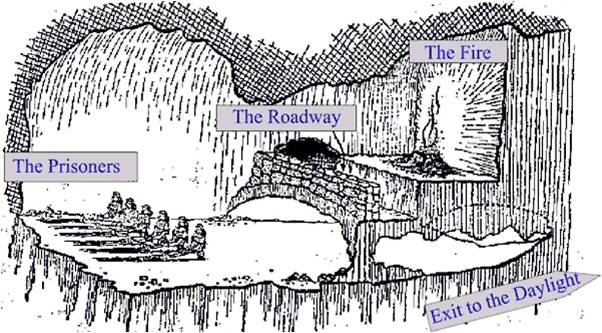
The prison dwelling corresponds to the region revealed to us through the sense of sight, and the firelight within it to the power of the Sun. The ascent to see the things in the upper world you may take as standing for the upward journey of the soul into the region of the intelligible. . . . In the world of knowledge, the last thing to be perceived and only with great difficulty is the essential Form of Goodness.
Once [the Form of Goodness] is perceived, the conclusion must follow that, for all things, this is the cause of whatever is right and good; in the visible world it gives birth to light and to the lord of light, while it is itself sovereign in the intelligible world and the parent of intelligence and truth. Without having had a vision of this Form no one can act with wisdom, either in his own life or in matters of state…. (Plato, Republic; Fiero 106, lines 121-37)
|
|
Plato’s Political Views
|
|
Anti-democratic (After all, a democracy condemned Socrates to death)
Philosopher-kings should rule (could be women)
Philosophers are fit to rule, soldiers to fight, laborers to work (mind, heart, hands)
The goal of society is not the happiness of the individual but to bring society as a whole as close as possible to the good
(Fiero 108)
Education for both men and women, according to their abilities
No private property
In Plato’s republic, no poets are allowed
(Fiero 108)
|
|
Plato’s objection to poets (Republic, Book 10)
|
|
Plato says poets:
1) lie; they don’t know or tell the truth
2) lead children and youth away from knowledge
3) they offer not ideas, or images of ideas, but images of images of ideas
|
|
Aristotle (384-322 BCE)
|
|
Student of Plato
Rejected Plato’s Theory of Forms, thought that mind and matter are connected
Empirical method: direct experience
Syllogism
End of life is happiness, “the good life” (Gr. Eudaimonia means both) (Ethics lines 42-51)
Happiness relates to “the function of Man”: “an activity of soul in accordance with reason” (Ethics lines 80-81)
(Fiero 109-10)
|
|
Aristotle, Nicomachean Ethics
|
|
“the object of our inquiry is not to know the nature of virtue but to become ourselves virtuous” (lines 83-84)
“It is necessary therefore to consider the right way of performing actions” (lines 85-86)
The Golden Mean: the mean between extremes—not absolute but specific to the individual
(Fiero 110)
Raphael, The School of Athens, 1509-10
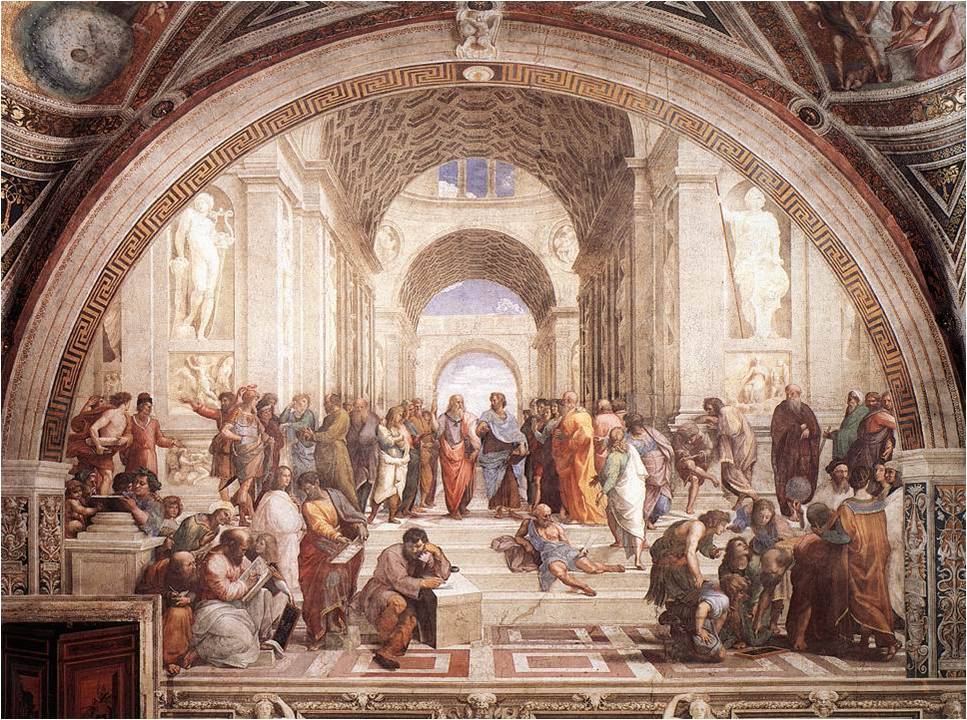
Raphael, School of Athens (detail):
Plato & Aristotle
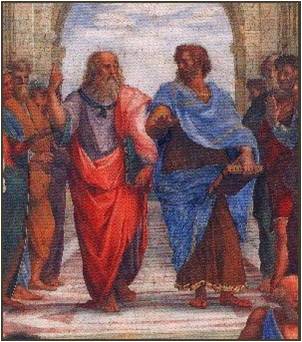
|
|
Aristotle, Politics
|
|
the best government is constitutional and ruled by the middle class—those who would be least likely to govern out of self-interest
man (Aristotle does not include or exclude women here) is a political animal—a polis person
(Fiero 111)
“[The] state is by nature clearly prior to the family and to the individual, since the whole is of necessity prior to the part. . . . The proof that the state is a creation of nature and prior to the individual is that the individual, when isolated, is not self-sufficing; and therefore he is like a part in relation to the whole”
(qtd. in Fiero 111).
In modern times, especially since the Romantic period, there has been a tendency to consider the individual as superior to society. But for Aristotle, the individual cannot exist without society—the individual, as he defined it, is constructed by society.

|
|
Work Cited
|
|
Fiero, Gloria. The Humanistic Tradition. Vol. 1. New York: McGraw-Hill, 2011.
|